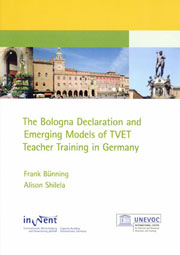
Le Centre International UNESCO-UNEVOC: Qui nous sommes | Ce que nous faisons | Nous rejoindre | Nous contacter
Le Réseau UNEVOC: En savoir plus sur le Réseau | Répertoire du Réseau UNEVOC
Espace Membres: Tableau de bord du Centre UNEVOC
Domaines thématiques: Inclusion et jeunes | Innovation et avenir de l'EFTP | Engagement du secteur privé | Les ODD et l'écologisation de l'EFTP
Nos programmes et projets clés: BILT: Connecter innovation et apprentissage | Renforcer la résilience de l’EFTP | Programme pour le leadership en EFTP | Journée mondiale des compétences des jeunes
Activités passées: Réponse COVID-19 | i-hubs: Former des pôles d'innovation | Forums mondiaux de l'EFTP | Conférences virtuelles | YEM Portail de connaissances
Nos services et ressources: Publications | Forum TVET | Profils nationaux d'EFTP | Glossaire TVETipedia | Pratiques prometteuses | Toolkits for TVET Providers | Formation à l’entrepreneuriat
Journal et événements: Grandes Manifestations EFTP | Journal UNEVOC

| Author/s: | Bünning, Frank; Shilela, Alison |
| Éditeur: | InWent - Internationale Weiterbildung und Entwicklung gGmbH Capacity Building International; UNESCO-UNEVOC |
| Publié: | 2006 in Bonn, Germany |
| ISBN: | 3-939394-00-9 |
The implementation of the Bologna Declaration (1999) has resulted in major changes to degree structures in Germany. The recommendation to adopt a two-cycle system of degree awards (Bachelor and Master) within a given timeframe represents a radical conceptual shift for curriculum designers and policy makers in German universities where the traditional degree system consists of one block of study leading to a Master degree. The process of this reform and its resultant consequences remain live issues in the university sector and can be observed as the focus for conference proceedings over the last six years. The reform has posed particular challenges to universities concerned with TVET teacher training, given the professional nature of this orientation. As the dust begins to settle on the landscape, a clearer picture of the newly-established models for Bachelor and Master degrees can be observed. With four years of further development ahead, this paper outlines generic developments in the university sector in Germany and focuses on the newly emerging structures of Bachelor and Master programmes in the TVET teacher training sector. The paper considers the extent to which such developments have remained in keeping with the original intentions of the Bologna Declaration and the positive changes envisaged by the TVET teacher training sector. Some aspects of the reforms can be seen to offer new opportunities and advantages for students and employers, while others have created a multifaceted landscape for TVET teacher training, which requires a shared understanding of the new programmes by universities and employers alike, if the new degree models are to achieve their originally-intended aims.